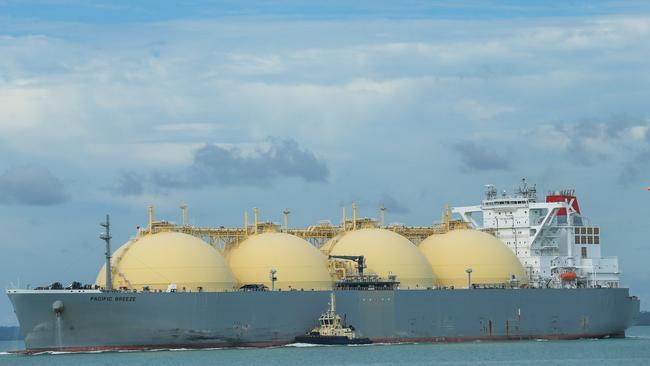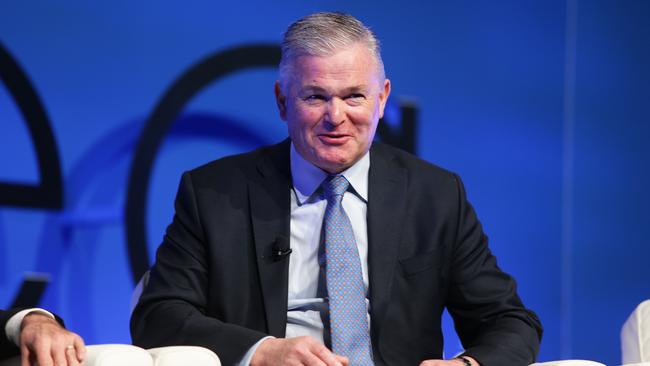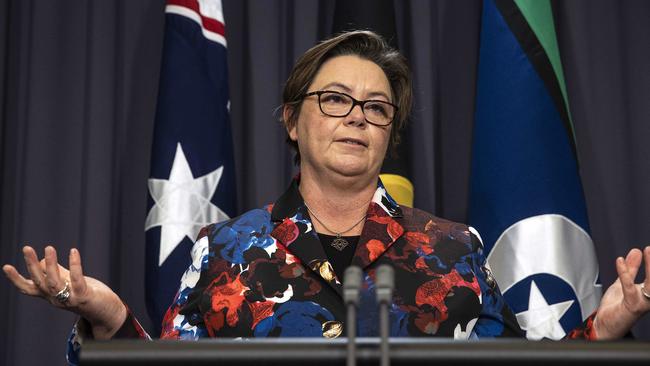Energy policy a risky gamble for the Albanese government

Pray that La Nina extends its unusual run, keeping the long spells of excessive heat away from Western Sydney.
Pray that there is no extended cold windless snap in Victoria this winter.
Pray that the supply chains clear up and the aggressive global competition for wind turbines does not leave Australia short, or much delayed in its renewables build-up.
Santos chief executive Kevin Gallagher is not alone in labelling the government’s latest intervention in the energy market as Soviet-style nationalisation.
What should concern business and the unsuspecting public is that left thinking is winning in Labor politics. Exhibit A is the recent power play in Victoria, a factional realignment that has locked in the left with four MPs, including Treasurer Tim Pallas, shifting from the NUW Right to the Socialist Left, as reported in The Australian on December 2.

The federal government’s stunning announcements, attempting to engineer energy transition without soaring power prices, include the $12 a gigajoule price cap on uncontracted gas and an ongoing requirement that pricing be made on a reasonable “cost plus” basis, baked into last week’s legislation. And there is the new Capacity Mechanism which excludes gas as one of the “firm power” options to stabilise the electricity grid, against the recommendations of the Energy Security Board. Note that the Victorian government has consistently refused to accept gas as part of the mechanism.
Of all of these changes, the energy sector is most anxious about the ongoing and seemingly subjective intervention on returns on major project investments after the cap is lifted.
Gallagher spoke for many on Thursday when he said the intervention would require Venezuelan-style bespoke “fiscal stability agreements” in order for companies to take investment decisions to secure new capital.
And he warned every business owner in the country about the Soviet-style government. “If it doesn’t like your business, your profits or the prices you charge for your products and services, it will regulate you. And it will regulate you if the unions don’t like your business.”
That sounds about right for Victoria. In NSW, however, there is a Liberal government heading for an election in March.
Last week that government declared the pipeline connecting the Santos Narrabri project to the east coast as critical infrastructure, putting it on a fast track. The $3.5bn gas project and the pipeline mean jobs and more jobs and fresh on-land gas supply for the domestic market.
Despite some market muttering that Gallagher would go as far as threatening to pull out of Narrabri, this did not happen.

The landscape is far from clear.
Some analysts suggest the new energy legislation threatens the building of LNG import terminals which also promise to deliver new gas supply into the market.
If that happens, it might even improve the numbers for Santos at Narrabri.
For now, however, Andrew Forrest’s LNG import project at Port Kembla expects to be able to import gas at the government’s “reasonable prices”, although this would have to be lower than current export prices, leaving Queensland production the alternative. And Viva Energy has said it remains positive about its LNG import project in Geelong.
Despite the affront, one should not assume that big gas believes the sky is falling in Australia. So far the response has been limited. Shell and Woodside called off talks with customers for new supply contracts after the government’s bait and switch – from the recent heads of agreement with the sector to full-on intervention for as long as Labor is in power.
But will this be enough for Brookfield and EIG to pull out of their takeover of Origin Energy, the former taking the gas peakers and retail network, the latter (through its subsidiary MidOcean) the stake in the APLNG export business? Unlikely.
When asked in late November about sovereign risk in Australia, MidOcean CEO De la Rey Venter told The Australian: “We believe in the quality of the regulatory environment and the quality of governance and quality of assets that we can see here.”
MidOcean sees through the one year of price caps. It will probably also see through Labor’s ongoing “reasonable price” intervention. The concern will come if Australia’s long-term LNG export contracts look at risk.
To date, the government has been careful to signal to countries like Japan – big customers for the potentially huge hydrogen export business – that the export contracts will not be touched. Resources Minister Madeline King has made at least two trips to Japan for this reason. Yet what if things do not go to plan for Labor?
What if a major blackout occurs when renewable power is not generating and the incentive for gas to be there as back-up has disappeared? Or if the pace of development in the Bass Strait or elsewhere slows and puts too much pressure on the Queensland spot market? Is there a risk the government will have to break LNG export contracts as the only near-term alternative?
What is not understood in the rushed-through legislation is what happens if there is a sudden shortage of gas. How does gas clear through the market if price no longer decides who gets the gas and who does not? Would the government prioritise limited power according to its own agenda? And where does that leave businesses the government does not like, to use Gallagher’s words?
The Prime Minister’s broad message to the industry is to suck it up. If there are no blackouts or brownouts over the next two years, he may get away with it. If blackouts do occur, the populist politics he is riding will change dramatically. Union voices will probably make sure of it.
The Ukraine crisis is so easy to blame. Unfortunately the government has turned a blind eye to the failed energy transition experiment in Europe that was evident well before the Russian invasion. The move to renewables went too far, too fast. The wind did not blow. Prices skyrocketed.
As Simon Benson writes in this paper, Prime Minister Albanese has played a high-stakes game and got what he wanted with legislation. He now owns the outcome of his new policies, the reaction from business and what The Almighty has in store for this land of drought and flooding rain.



This government needs to pray and keep praying.